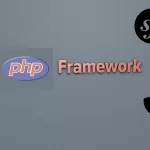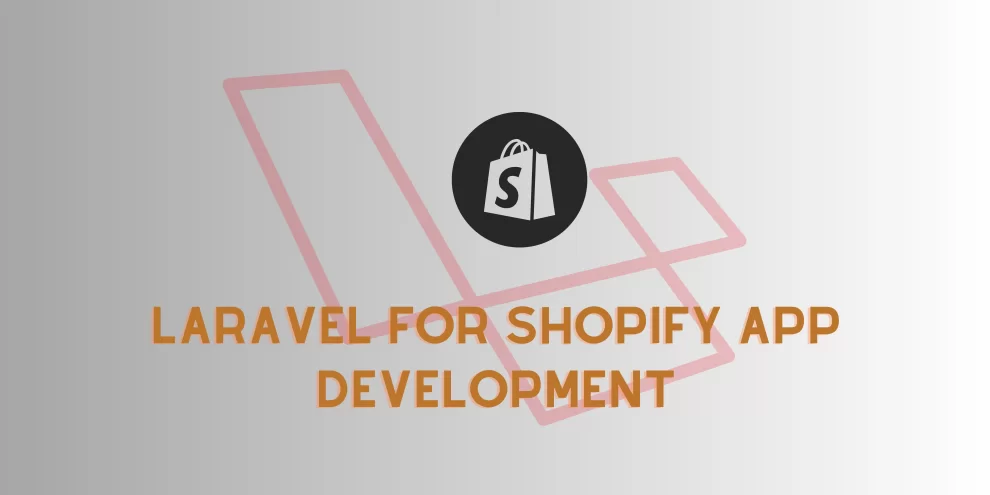In the ever-evolving landscape of e-commerce, the choice of a development framework plays a pivotal role in shaping the success of your Shopify app. It’s imperative to choose Laravel for Shopify app development. Laravel, a powerful PHP framework, stands out as a formidable ally in the realm of Shopify app development, offering a multitude of advantages that can elevate your e-commerce projects. This exploration delves deep into the world of Laravel, unveiling the significant benefits it brings to the table. Whether you are a seasoned developer or new to the field, understanding the merits of Laravel in the context of Shopify app development is the first step toward making informed decisions that can steer your projects towards excellence.
Laravel’s journey as a preferred framework for Shopify app development commences with its unwavering commitment to code quality. It boasts a clean, structured codebase that not only simplifies the development process but also ensures long-term maintainability. This advantage allows developers to dedicate more time to enhancing the app’s functionality and less to debugging and troubleshooting. Additionally, Laravel accelerates development with its extensive library of pre-built components and tools, enabling the rapid creation of high-quality Shopify apps, a vital edge in the fast-paced world of e-commerce.
What Is Shopify App Development with Laravel?
Shopify app development with Laravel is a dynamic process that involves leveraging the Laravel PHP framework to build and enhance applications specifically designed to integrate seamlessly with the Shopify e-commerce platform. In essence, it combines the robust features and capabilities of Laravel with the extensive e-commerce capabilities of Shopify to create feature-rich and scalable applications that cater to the unique needs of online businesses.
Laravel, known for its elegant code structure and developer-friendly features, acts as the underlying framework that powers the application, providing a solid foundation for creating custom Shopify apps. These apps can serve various purposes, such as enhancing the shopping experience for customers, streamlining order management, or automating various aspects of the e-commerce operation.
By utilizing Laravel in Shopify app development, developers can take advantage of Laravel’s rapid development capabilities, exceptional code quality, built-in security measures, and scalability features, all of which are essential for creating high-performing and reliable e-commerce applications. The combination of Laravel and Shopify empowers developers to design and implement custom solutions that meet the unique needs of online businesses, ultimately contributing to the growth and success of e-commerce ventures.
Also Read: Laravel 2023: Top 10 PHP Framework Advantages
Benifits of Opting for Laravel in Shopify App Development
1. Code Quality:
- Laravel enforces best practices and a clean code structure, making your Shopify app’s codebase highly organized and readable.
- Well-structured code simplifies collaboration among developers and future maintenance, reducing development time and costs.
- Laravel’s code quality ensures fewer errors and bugs, leading to a more stable and reliable Shopify app.
2. Speedy Development:
- Laravel’s pre-built components, like authentication, routing, and form handling, save significant development time.
- This speed is critical in the e-commerce industry, where rapid development can give you a competitive edge.
- Quick development means you can iterate on your app, test new features, and respond to market changes more efficiently.
3. Enhanced Security:
- Laravel provides robust security features, including encryption, cross-site request forgery (CSRF) protection, and input validation.
- Your Shopify app will be better shielded from common web vulnerabilities, such as SQL injection and cross-site scripting (XSS).
- Improved security protects sensitive user data and builds trust with your customers.
4. Scalability:
- Shopify apps often experience surges in user traffic during promotions or holiday seasons. Laravel’s scalability ensures your app can handle increased loads without performance degradation.
- You can add more servers or resources as needed, ensuring a seamless shopping experience for your customers.
- The ability to scale is essential for long-term growth and success in the e-commerce market.
5. Supportive Community:
- Laravel boasts a vibrant and responsive community of developers and resources, providing valuable assistance during the development process.
- Online forums, tutorials, and documentation are readily available, allowing you to troubleshoot issues and access useful insights.
- Joining this community ensures you’re never alone in solving problems and staying updated with the latest developments in Laravel.
6. Integration Ease:
- Laravel simplifies third-party integration through its well-organized structure and a rich ecosystem of packages.
- Whether you need to connect to payment gateways, shipping providers, or marketing tools, Laravel streamlines the integration process.
- Effortless integration enhances the functionality of your Shopify app and enables you to offer a more comprehensive e-commerce solution.
7. User Authentication:
- Laravel offers built-in user authentication features, saving you time and effort in implementing user registration and login.
- Role-based access control ensures that only authorized users can perform specific actions within your app.
- Simplified user authentication enhances the security and user experience of your Shopify app.
8. Artisan Tool:
- Laravel’s Artisan command-line tool automates various development tasks, such as creating controllers, models, and migrations.
- You can generate boilerplate code, run database migrations, and execute custom commands, all of which enhance development efficiency.
- Artisan simplifies routine tasks, allowing you to focus on implementing core features and functionality.
9. Eloquent ORM:
- Eloquent, Laravel’s Object-Relational Mapping (ORM) system, simplifies interactions with the database.
- It offers an intuitive and expressive syntax for defining and querying database tables and relationships.
- Eloquent reduces the complexity of managing database operations, making data handling more efficient in your Shopify app.
10. Testing Support:
- Laravel comes with PHPUnit integration and built-in testing features that facilitate the creation of unit tests and functional tests.
- Testing ensures that your app functions reliably, catching potential issues before they reach your users.
- Robust testing support leads to a higher-quality Shopify app with fewer post-release problems.
11. Dynamic Views:
- Laravel’s Blade templating engine provides a straightforward way to design dynamic and engaging user interfaces.
- Templating with Blade enhances the visual appeal of your app, making it more appealing to users.
- Dynamic views are essential for creating a captivating and responsive e-commerce shopping experience.
12. Task Scheduling:
- Laravel’s task scheduling and queue management features are invaluable for handling background tasks.
- You can schedule tasks to run at specific intervals or in response to events, improving the efficiency of your app.
- Task scheduling ensures that critical operations, such as order processing and email notifications, are carried out without manual intervention.
Each of these advantages demonstrates why choosing Laravel for Shopify app development is a strategic decision, enabling you to create a high-quality e-commerce solution that meets the demands of the competitive online marketplace. Laravel’s exceptional code quality, speed of development, robust security, scalability, and supportive community can empower you to develop a successful and reliable Shopify app that stands out in the e-commerce industry.
Also Read: How to Create REST API Using Laravel
How to create Shopify apps with Laravel?
Creating Shopify apps with Laravel involves a series of steps to ensure seamless integration and functionality. Here’s a high-level overview of the process:
1. Set Up Your Development Environment:
- Ensure you have a development environment with PHP and Laravel installed.
- Install the necessary tools and dependencies, including Composer, a package manager for PHP.
2. Register Your App on Shopify:
- Log in to your Shopify partner account.
- Create a new app in the Shopify Partner Dashboard.
- Obtain API credentials, including your API key and API secret key.
3. Develop the Laravel Application:
- Create a new Laravel project or use an existing one.
- Implement the necessary routes, controllers, and views for your app.
- Utilize the Laravel framework to build the functionality your Shopify app requires.
4. Install Shopify App Bridge:
- Use the Shopify App Bridge package to interact with Shopify’s API.
- Install the package using Composer.
5. Set Up Authentication:
- Implement OAuth 2.0 authentication to allow your app to access a Shopify store.
- Create routes and controllers to handle the OAuth flow.
- Store and manage the access tokens securely.
6. Develop App Features:
- Create the features and functionality your app will provide to Shopify store owners.
- This can include features like order management, product synchronization, reporting, and more.
7. Test Your App:
- Use a development store or the Shopify Development Store to test your app.
- Ensure that it functions correctly and meets the requirements.
8. Submit Your App for Review:
- When your app is ready, submit it to the Shopify App Store for review.
- Ensure your app adheres to Shopify’s guidelines and policies.
9. Deploy Your App:
- Once your app is approved, deploy it to a production server or cloud hosting.
- Update the app settings with the production credentials.
10. Maintain and Support:
- Continuously monitor and maintain your app.
- Address user feedback and provide support to users.
Creating Shopify apps with Laravel requires a strong understanding of both Laravel development and Shopify’s API. Additionally, Shopify provides detailed documentation and resources for developers to guide them through the process, making it easier to integrate your Laravel app with the Shopify platform effectively.
Conclusion
In conclusion, the choice of Laravel for Shopify app development offers a wealth of benefits that can elevate your e-commerce venture to new heights. When you choose Laravel for Shopify app development, you gain access to a powerhouse of features and capabilities that can propel your e-commerce venture to success. From the exceptional code quality that simplifies maintenance to the rapid development capabilities that give you a competitive edge, Laravel proves to be a formidable ally in the realm of e-commerce app development.
Enhanced security features, a hallmark of choosing Laravel for Shopify app development, protect your app and user data, fostering trust and reliability. The scalability provided by Laravel ensures that your Shopify app can seamlessly grow with your business, accommodating increased users, products, and orders without performance concerns. When you choose Laravel for Shopify app development, you are making a strategic choice that equips you with the necessary tools and capabilities to create a powerful and reliable Shopify app, providing a seamless shopping experience for your users.
Moreover, Laravel’s active and supportive community stands as a pillar of strength, offering valuable resources and assistance throughout the development journey. The ease of third-party integration, streamlined user authentication, and automation with Artisan enhance development efficiency, allowing you to focus on core features. The Eloquent ORM simplifies database operations, while comprehensive testing support ensures the reliability of your app. Dynamic views created with Blade templating enrich the user experience, and task scheduling streamlines background operations. With Laravel as your trusted companion, you are well-prepared to succeed in the fiercely competitive world of online commerce. Make the intelligent choice and embark on your Shopify app development journey with Laravel to choose Laravel for Shopify app development.















